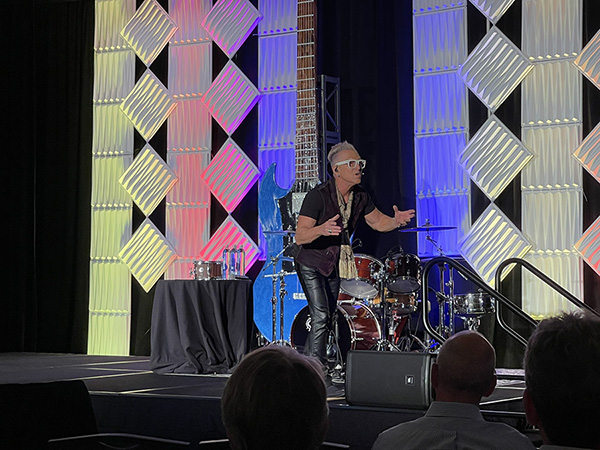Rocking and Rolling at ZIW
The annual user event was tuned into AI, but that’s not the only melody being played.
Zuken welcomed customers and partners to Cleveland in September for the electronics design software company’s annual users event, providing an opportunity for networking and a backstage pass to the company’s most recent software updates and future innovations.
Zuken Innovation World Americas, colocated with Vitech’s Integrate24, opened with comments from Kent McLeroth and Enrique Krajmalnik, the chief executives of Zuken USA and Vitech, respectively, and a keynote address befitting its location in the supposed birthplace of rock and roll with Mark Schulman, drummer for such artists as P!NK, Billy Idol, Foreigner and Cher.
Schulman shared his musical journey and some of the lessons learned from rock’s legends, as well as his own methods to change his perspective and enter a “rock star” state of mind – whether on the stage or in daily life.

Rock drummer and motivational speaker Mark Schulman shared his tips for achieving the “rock star” state of mind at ZIW’s keynote address.
Overall, the Americas version of ZIW – the company runs similar events in Europe and Asia each year – featured more than 50 technical sessions, including one focused on AI collaboration in PCB design by Kyle Miller, Zuken’s technology research and strategy manager spearheading the company’s foray into AI-based design.
Miller said the company’s current AI integration is intended to serve as a copilot for ECAD designers, offering routing suggestions or initial suggestions for parameters, which users can implement or ignore. User feedback is then used to train the AI for the future, tuning the model’s response to the actual designer’s own knowledge and preferences.
Zuken launched AIPR (Autonomous Intelligent Place and Route) as an add-on for its CR-8000 PCB design software last year, allowing AI-based placement and routing as part of the first of three phases of AI development. The first phase, Basic Brain, is where the company currently is on its roadmap and uses Zuken’s library of designs to enable smart autorouting.
For the next phase, Dynamic Brain, Zuken plans to allow customers to integrate their own designs into its AI algorithms to accelerate the design process and improve productivity. With its final phase, Autonomous Brain, the company aims to develop an AI model that can continuously learn and improve its own capabilities.
Over the coming years, Zuken will refine its AI collaborative tool and consider user feedback while developing the next phases, which will continue to learn from design examples and take a more active role in design to improve productivity and allow designers to focus on higher-level design concepts, Miller said.
A session by solutions architect Lance Wang focused on the importance of power integrity screening in high-speed designs. With electronics getting smaller and faster, power delivery is becoming a more critical aspect of a design, and PI screening will speed up the design process, he said.
Conceptual issues that can derail a design from the start, such as poorly designed planes, bottlenecks and violations of impedance limits, can be quickly found with the CR-8000 design software’s EMC Adviser screening capabilities, which allows corrective action before digging into the detailed analysis for the finer issues that may occur, Wang said.
Electromagnetic compatibility was the focus of another presentation by technical account manager and senior applications engineer Andy Buja, who discussed the inefficiencies in a typical design process that doesn’t verify EMC compliance until the testing phase. Through use of design rules and constraints in EMC Adviser, the program can catch any EMI issues in the placement and routing phase, allowing designers to make corrections earlier in the workflow to speed up the design process, he said.
For those using CR-8000, the event also featured several instructional sessions that examined techniques for improving productivity. Zuken's manager of engineering operations, Steve Watt, outlined recent updates to the software, including the addition of new autorouting features, while application engineer Chuck Bassett shared some tips automating certain processes in Design Force and Design Gateway – CR-8000’s programs for designing single and multi-die packages and logical circuit design and verification, respectively.
Aside from the technical sessions, ZIW also featured an exhibition with several of its partners, including KSD Technologies, MID, Cetec ERP, Harness Works and ECAD-Port. Also returning was the popular Genius Bar, which allowed users of CR-8000 ECAD, E3.series wiring harness software, and other Zuken products to speak directly with company experts to get answers to questions or solve issues they may be having.
With around 150 attendees at the conference, including Zuken staff, the event offered opportunities for a deeper understanding of the company’s offerings, as well as the ability to network with their peers and some of the leaders in the industry, said Amy Clements, director of marketing communications.
“One of the main objectives was to empower participants with the knowledge and tools they need to drive innovation within their own organizations,” she said. “This is an exciting time for Zuken, and we're looking forward to building on the momentum.”
is managing editor of PCD&F/CIRCUITS ASSEMBLY; This email address is being protected from spambots. You need JavaScript enabled to view it..




